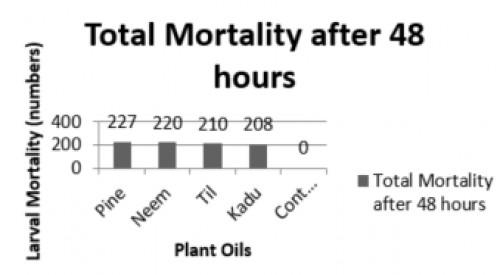Laboratory study on larvicidal activity of different plant extracts against Aedes aegypti
Author(s): Muhammad Uzair Mukhtar, Shumaila Mushtaq, Ali Arslan, Arkam Bakhtyar Zaki, Muhammad Hammad, Adil Bhatti
Abstract: Background: Mosquitoes transmit serious human diseases causing millions of deaths every year. Use of synthetic insecticides to control vector mosquitoes has caused physiological resistance and adverse environmental effects in addition to high operational cost. Insecticides of botanical origin have been reported as useful for control of mosquitoes. Methodology: WHO methodology was adopted for larvicidal bioassay. Thirty late 3rd and early 4th instar larvae were subjected to four different concentrations i.e. 1%, 2%, 3% and 4% against Cucurbita moschata (seed), Sesamum indicum (seed), Azadirachta indica (Leaves) and Pinus roxburghii (Bark) oils in acetone as solvent. Mortality counts were made every 24 and 48 hours in each treatment. The LC50, LC99, standard error, fiducial limits at 95% confidence and regression equations were calculated. Results: The results showed neem and pine oil extracts are best in terms of LC50 andLC99, with 100% mortality at 3% and 4% concentration after 24 hours. The trend with respect to LC50 and LC99 after 48 hours was Pine > Neem> Til > Kadu respectively. Conclusion: The results suggested these plant extract were found effective in controlling Aedes aegypti larvae under lab conditions. As these trees are widely distributed in Pakistan, their formulation might prove to be an effective and eco-friendly larvicide, which could be used as an alternative for dengue control.
 Fig.:
Fig.: Total Larval mortality of
Aedes aegypti against different crude plant oils after 48 hours
How to cite this article:
Muhammad Uzair Mukhtar, Shumaila Mushtaq, Ali Arslan, Arkam Bakhtyar Zaki, Muhammad Hammad, Adil Bhatti. Laboratory study on larvicidal activity of different plant extracts against Aedes aegypti. Int J Mosq Res 2015;2(3):127-130.



